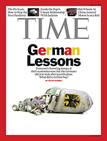Germany, U.S. Still Worlds Apart on Economic Policy?

As the global economic crisis questions many long-hold beliefs about American and European economic policy, the U.S. press has discovered that some answers might be found across the Atlantic. Germany offers a fine case study for the advantages as well as drawbacks of increased government interference to bring the economy back on track.
Here is the Wall Street Journal’s take on the social security net in the U.S. and Germany, embodied in two workers who have to face the economic downturn. The German worker, upon loosing his factory job, decides not to cancel his vacation in Cyprus, because his income will be secure. His American counterpart has to evaluate his complete budget to find out where to make cuts. The article is an informative read, well backed up with statistics.
Atlantic Review, in reaction to the WSJ article, points out that while the American system offers a more flexible labor market, that makes sure the economy can bounce back fast after a recession, the German system creates less panic during the recession. The question is, in which system do we want to live?
TIME Magazine has devoted the cover of its European issue to answer “What Germany got for Its $2 Trillion.” The main example is Halle, a town that has been successful in stimulating industry and job growth with money from the reunification fund, even if success simply means loosing less jobs and population than other former industrial centers of the GDR. There are three lessons for the U.S. to be drawn from Germany’s attempt to spend its way out of a major economic slump:
“[T]hrowing money at an economic meltdown isn’t a cure-all.” Two decades after the fall of the wall, former East Germany still lacks behind economically. 20% of the German population live here, but the region accounts for over 30% of Germany’s unemployed.
“[B]ig spending packages don’t work if the economic policies underlying them are miscued.” The decision by Chancellor Helmut Kohl to exchange West and East German currency 1:1 sabotaged the competitiveness of East German industries.
“[S]pending so much money in such a short time is bound to be wasteful.” This one is a no-brainer. Try getting a year’s worth of shopping done in one day. Then see how much of the stuff you bought you will actually need. Chances are, you got yourself a Cargolifter.
What can the U.S. draw from this? Mainly that expectations for the American stimulus package should not be too high. There will be failure. Also, failing fiscal policy can partly be blamed on monetary policy not being in step. Ideally, the two should be carried out in unison.
At the same time, the discussion about culture as the determing factor for fiscal policy is still raging on. Phillip Stevens at the British Financial Times thinks that Europe’s reaction to the crisis is fearful. His main point is that the stimulus needs to be bigger, but he also argues that “Americans are happy to take risks while Europeans strive to avoid them. This is as often reflected in their respective economic performances during good times as in their reactions at moments of crisis. Gamble-everything entrepreneurs are much more likely to be found on the US side of the Atlantic.”
At the same time, Roger Cohen, reporting actually from Germany, thinks the opposite. Writing in German in the Sueddeutsche Zeitung Magazin, he has recently proclaimed that German Angst is over. Looking at the traumatic 20th century, the biggest economic crisis since the 1930s will not cause mass panic with Germans, Cohen concludes. In fact, the Americans are the ones who are shuddering now, while they witness the American empire falling apart.
As we have said before, the political process is a little more complicated than gross stereotypes like this one want to make you believe. Dear Mr. Stevens, if you want to make the point that the European stimulus needs to be bigger, focus on why the governments oppose your idea, and argue against them. Blaming it all on cultural differences is a logical shortcut that leads you off the track.

2 Comments, Comment or Ping
Stacey Derbinshire
I found your site on Google and read a few of your other entires. Nice Stuff. I’m looking forward to reading more from you.
May 14th, 2009
Reply to “Germany, U.S. Still Worlds Apart on Economic Policy?”
You must be logged in to post a comment.